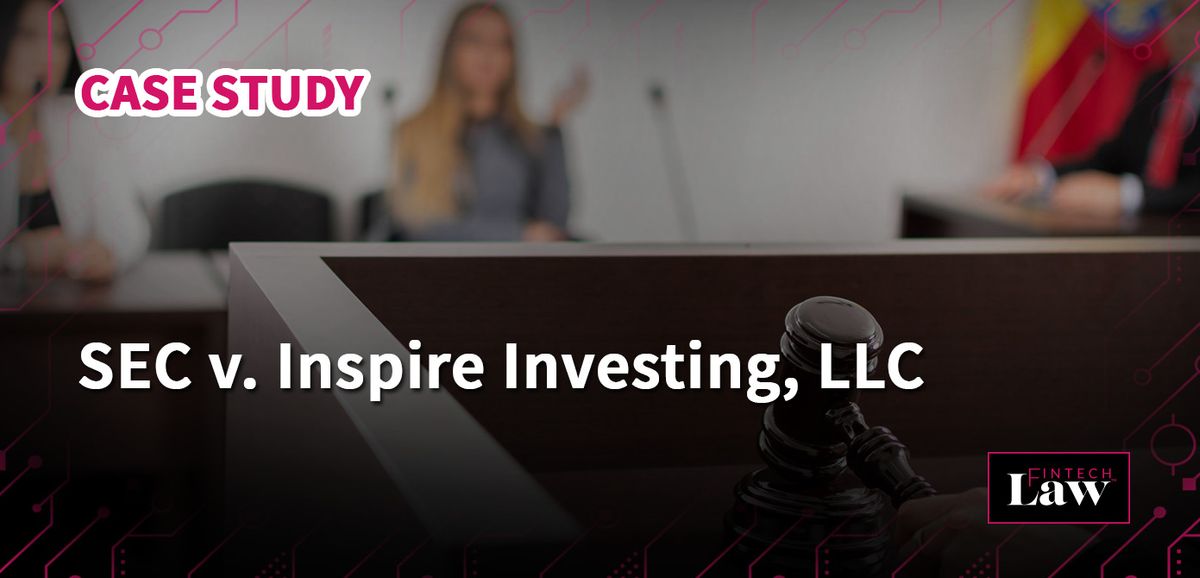Case Study: SEC v. Inspire Investing, LLC

December 13th, 2024
Table of Content
Background
Legal Issues
Case Outcome
Broader Implications
Key Takeaways
References & Resources
Background
Industry Context
- The whole basis of the finance and investment industry is cemented in trust and honesty. It is therefore the responsibility of relevant role players to conduct transparent business dealings. Considering the above, this was one of the crucial mistakes that led to the SEC's case against Inspire Investing LLC (“Inspire”).
Company Details
- Inspire has been registered with the SEC as an investment advisor since 2017. They provide an investment advisory service to eight exchange-traded funds. They also manage $2.5 billion in regulatory assets.
Key Events Leading to the Case
- The SEC's order finds, from at least 2019 to March 2024, that Inspire misstated its investment management process to its clients.
- Inspire follows a system of biblical responsible investing. This method uses a science-based data-driven system whereby companies are scored either negatively or positively according to a value system. It is purported that a company with a negative score will not be favored for investment.
- The fault in the system arose when it was determined that a misrepresentation occurred regarding the research process followed.
- Another key element in the case is the fact that no reasonably designed procedures and policies with regards to the investment processes were followed, and also lacked written policies and procedures.
Legal Issues
Allegations/Claims/Violations
- The fact that Inspire Investment LLC misrepresented its procedures to its clients coupled with their various compliance irregularities led them to be in violation of the anti-fraud provisions of the following laws:
- Section 206(4) and Rule 206(4)-8 of the U.S. Investment Advisers Act of 1940 (the “Advisers Act”): This section specifically references that investment advisors are prohibited from engaging in deceptive, misleading or fraudulent acts. (“to engage in any act, practice, or course of business which is fraudulent, deceptive, or manipulative”.)
- Section 34(b) of the Investment Company Act of 1940 (the “Investment Company Act”) : As per this section, companies are required to disclose relevant information to investors regarding investment policies.
Case Outcome
Verdict/Settlement
- Inspire neither admitted nor denied the SEC's findings. They acknowledged the findings and agreed to a censure and cease-and-desist order.
- A fine of $300,000 was issued.
- Inspire also agreed that the services of an independent compliance consultant be retained.
Implications
- The act of misrepresentation conducted by Inspire had far reaching consequences. Not only did it greatly affect the trust relationship with its client base, but it also caused a gross violation of business practices.
- The research methodology used was not comprehensive enough, causing certain companies linked to prohibited activities, to fall within the investment group.
- The whole process was not conducted as stated in the relevant policies and procedures, faulting the company on overall transparency.
Broader Implications
For the Fintech Industry
- This case has shown light on comprehensive investor data analysis and research.
- Company policies and procedures should also document and cross reference to this, as a complementary system of the whole process.
- Combining the two is a certain level of transparency between the investor and the actual investment process.
Regulatory Trends
- Comprehensive data-driven research processes in the investment environment.
- Comprehensive company policies and procedures implemented successfully.
Future Considerations
- A certain level of transparency will be required to ascertain best practices in all Fintech companies. This will create trust and investor confidence and ensure regulatory compliance.
- More comprehensive investor education initiatives to ensure a more confident investor client based.
Key Takeaways
Lessons Learned
- Policies and procedures require comprehensive corresponding implementation strategies.
- Research activities regularly evaluated will identity certain risk factors in the overall investment process.
- Transparency is key to ensure that risk management process can be implemented to combat potential pitfalls in the investment process.
Practical Tips
- Regularly evaluate company's policies and procedures.
- Match this to outputs achieved from relevant research tasks to evaluate the impact of the tasks performed.
- Conduct regular process audits to identify and mitigate risk factors within the company.
References & Resources
- SEC Press Release : SEC.gov | SEC Charges Advisory Firm Inspire Investing With Misleading Investors Regarding Its Investment Strategy.
- Direct Case Link :
- SEC.gov | Laws and Rules.
- The Key to Trust in Financial Reporting: Faithful Representation - Accounting Insights.
Book Consultation
Need help understanding how to ensure compliance and transparency in your Fintech company?
Contact us today for a consultation.
BOOK NOW .
